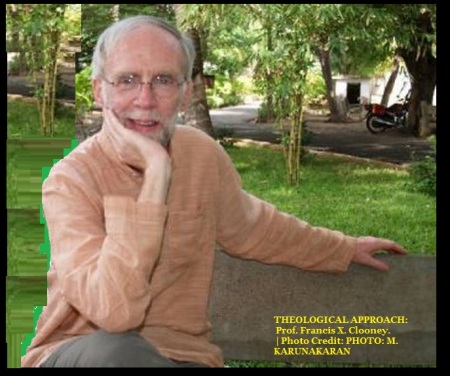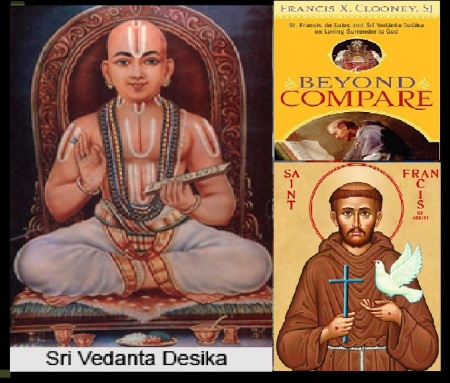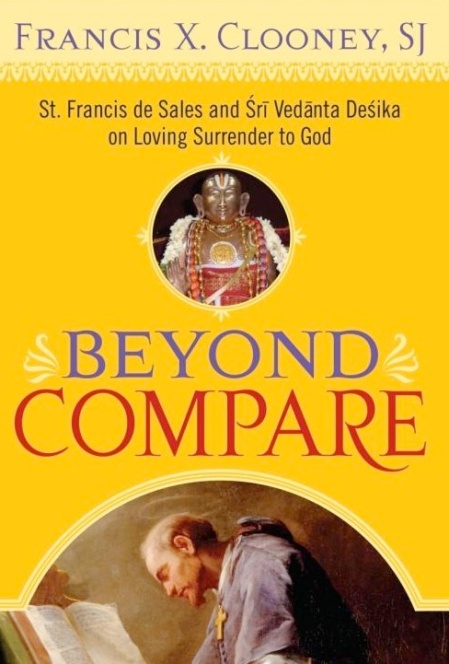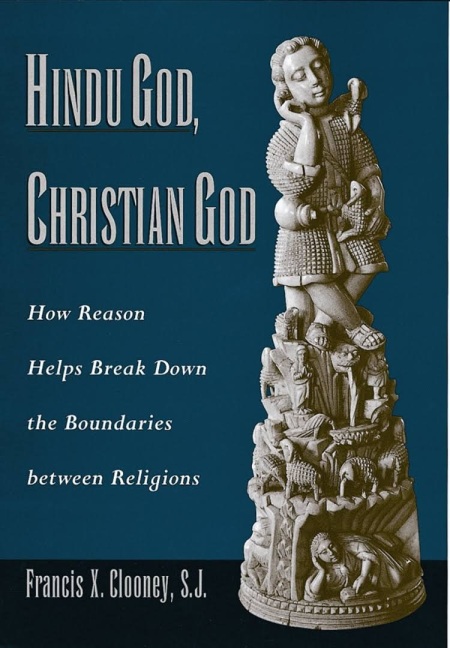Interestingly, Francis Clooney who had been in Chennai having his “dialogue” with many of his “Vaishnavite” friends as pointed out in my previous postings / blogs:
Perhaps, before leaving, his last “encounter” has been as follows:
On a philosophical quest by PRADEEP CHAKRAVARTHY
http://www.hindu.com/fr/2009/08/14/stories/2009081450950100.htm
| What does Vaishnavite scholar Vedanta Desika have in common with Catholic priest St. Francis? Prof. Francis X. Clooney discusses the link in his latest book. |
Srivaishnavism is an interesting tradition, philosophically and theologically.

PHOTO: M. KARUNAKARAN

THEOLOGICAL APPROACH: Prof. Francis X. Clooney. The coming together of any two religions for most of us could mean raised voices and bloodshed… quite paradoxical to what all religions preach. But Prof. Francis X. Clooney, S.J., Harvard University, and author of several books, has a different perspective.
Prof. Clooney spoke about his book ‘Beyond Compare: St. Francis and Sri Vedanta Desika on Loving Surrender to God’, during a talk organised by Prakriti Foundation at Madras Terrace House recently. In his work, he compares the two preceptors who were from different times and countries, and practised different religions, but who were united in their approached the concept of surrender to God.
Prof. Clooney pointed out that since his work was like the interpretative work of a dancer or a musician, there was a great deal of practice and hard work that went into it right from the choice of subject. “It took me several years to narrow down on whom to compare”, he said. He added that “the minute you compare to celebrate one over the other, or compare to just get common quotes, it is not comparison in the real term.”

So what does Vedanta Desika, the 13/14th century preceptor for Vaishnavites, have in common with St. Francis, a 17th century Catholic priest from Geneva? Both valued writing and in their written work, they hoped to pursue the devotee to perform a religious act itself. Both sought to transform the reader and used older texts to reinforce their message. Most important, both urged the reader to introspect and find out what it takes for him to surrender unconditionally to God. The book has several interesting passage on these topics. The audience was treated to a few enthralling readings. Catching up with Prof. Clooney after the session for a short interview, helped put the book in a greater context. Excerpts:
Tell us a little about your research: I work in certain traditions of classical Hinduism, including Mimamsa Vedanta and Srivaishnavism. Of course, my work as a professor leads me to write on other topics and themes at times, but these are my areas of focus in the study of Hinduism. Beyond these, I am also a comparative theologian, and so, I reflect on what I learn from Indian traditions alongside my understanding of my Christian bearings. And, to understand comparative study, I am also a bit of a historian, studying how Western Jesuits over the centuries have understood Hinduism.
What got you interested in Srivaishnavism? It is a very interesting tradition, philosophically and theologically, and it shows us a complete religious way of life. The fact that Srivaishnavism flourishes in both Tamil and Sanskrit makes it all the more beautiful. The poetry of Divya Prabandham in particular is very lovely. I also appreciate the Vaishnava temples, their architecture, imagery, and the worship that takes place there. In many ways, I have found Srivaishnavism to be parallel to Roman Catholicism, with a similar depth, breadth, and wholeness.

Beyond compare: Wrapper of the book
What is your mission on comparative religious studies and what forces do you see helping/hindering it? I am a professor at one of the oldest and best universities in the U.S., and also a Catholic priest and Jesuit. So my mission is academic — scholarly writing on topics of religious importance, and doing comparative study. It is also spiritual, in the sense that I believe that inter-religious truths and understanding are valuable to one and all. If my work helps people appreciate and learn from other religions, then I think I would have succeeded and will be very happy. If people become more convinced of the truth of their own tradition, with deep faith, that too is very good. Since there is a lot of religious misunderstanding and intolerance today, my hope is that my work will probably show a way for people to relate to other religions more constructively and positively.
Your future plans and interests…: I have several book projects in mind, including more work on the Srivaishnava Bhagavatha Visaya, certain songs and commentaries compared with medieval Christian commentary on the Biblical Song of Songs. I have also been doing research on the Jesuit tradition of inter-religious learning in India, and may soon have something more to write on that.

Written word: Some of the books written by Prof. Clooney are:
• Hindu God, Christian God: How Reason Helps to Break Down the Boundaries between Religions (2001),
. Teaching Wisdom to the Wise
• Divine Mother, Blessed Mother: Hindu Goddesses and the Virgin Mary (2005),
• Beyond Compare: St Francis de Sales and Sri Vedanta Desika on Loving Surrender to God (2008).
Tags: bhagavatha, Divya Prabandham, jesus, lakhsmi, mary, saranagathi, sri, srivaishnavism, surrender, Vedanta Desika, visaya, vishnu
August 20, 2009 at 6:51 am |
I have already sent a rejoinder to “The Hindu”, if they do not publish, then I shall post it here to register my protest.
August 21, 2009 at 7:27 am |
As “The HJindu” did not publish any letter sent, as dedcided I post my letter sent to “The Hindu” in response to Clooney’s interview, as follows:
To
The Editor,
The Hindu,
Mount road,
Chennai – 600 002.
letters@thehindu.co.in
Sub: “On a philosophical quest” by Pradeep Chakaravarthy appeared in Friday Review of “The Hindu” dated 14-08-2009
-0-
Pradeep’s Chakravarthy’s very first line, “The coming together of any two religions for most of us could mean raised voices and bloodshed… quite paradoxical to what all religions preach” itself has been misconceived in the context, as only the Christian Clooney has been experimenting with Srivaishnavism, as against no Vaishnavite appears to have made such attempt “to come together”. Neither, the learned Clooney, as a professor, comparative theologian, Catholic priest, Jesuit, “a bit of “ historian all rolled into one has not pointed out his counterpart.
It is quite understandable that he had to work hard as “a dancer or a musician” to practice the principles of Srivaishnavism and then attempt his “comparative theological methods”: of interpretation. That it took many years to gather courage to compare Vedanta Desika with De Sales or vice versa of various periods proves that he has made some compulsive theology rather than comparative theology.
Unfortunately, he does not acknowledge as to how he learned such principles from the Vaishnavite Pundits, scholars and others. His too much self- eulogization exhibits his professional arrogance, religious bias and suppression of facts of his learning Srivaishnavism. Moreover, no Vaishnavite scholar seems to have accepted about the correctness of his “comparative methodology”.
It is evident that he has been put forwarding the ideas of inter-religious dialogue as a part of Vatican Council – II declaration in a couched manner as “inter-religious” truth, “inter-religious” learning and so on as part of “inculturation”, as he has explicitly recorded in his books.
Yours faithfully,
Vedaprakash
14-08-2009.
From
Vedaprakash
103/68, College Road,
Nanganallur,
Chennai – 600 114.
vedamvedaprakash@yahoo.com
August 21, 2009 at 7:33 am |
I request others to post their letters here.
As in the case of “Catholic Ashrams”, the unpublished letters with other connected articles compiled together could be brought out in the form of a book.
August 21, 2009 at 7:49 am |
From
M. Nachiappan,
42, Mela Avani Moola Veedhi,
Madurai – 625 001.
ompalaniappan@yahoo.com
To
The Editor,
The Hindu,
Anna Salai,
Chennai – 600 002.
letters@thehindu.co.in
Sub: Rejoinder to the article “On a philosophical quest” by Pradeep Chakravarti.
Ref: The Hindu Friday Review dated 14-08-2009.
As a resident of Madurai, I could understand the “inculturation” involved in the books of Francis X Clooney, as his role-model has been Roberto de Nobili (refer to Clooney’s website, his papers, blogs etc), who conducted his experiments here in Madurai setting up his ashram, forging “Yesuveda”, donning ochre robes, fooling Hindus etc.
From the days of Arumuga Navalar, we have seen how the Saivites been suitably refuting the Christian writings, and therefore, perhaps, now they have turned their attention towards Vaishnavites.
Indian God according to Vedas has been unique-Brahmam and the Indian believers know the only “One God” and none else, as the Indian God ever worries about the existence of other God like biblical god, as He knows that he is the God. However, when certain human beings become great exhibiting divine qualities unlike ordinary mundane-beings, they deify them treating as “god” but not “God”.
The westerners, non-Indians and non-Hindus rarely understand and thus they try to misinterpret Indian concept of unity of God, misrepresent the deified Godheads and create confusion and differences among the believers.
Thus, the same methodology is revealed in the comparative theology of Clooney. A cursory glance of the works attributed to Francis de Sales shows that he lived in a period of Catholic-Protestant theological strife. His “Catholic controversy” exposes the biblical forgeries and interpolations questioning the faith. Thus, with much complexities of theology, he might have decided to “surrender” to God in the utter desperation, as he had no other way in such a conflicting life.
But, the devotional Indian approach to God has been different and it could be learned even from an ordinary Indian, who has been always God-conscious with clear concept of the omniscient, omnipotent and omnipresent nature of God. For him no “suffering” is required, to “surrender” or prepare himself to “sacrifice” himself, crying “Oh God, oh God, why you have forsaken me?”, letting his “spirit” out, commend spirit in His hands, and let the body resurrect on “the day of judgment” after “second-coming”!
Thus, in his attempt, “Beyond Compare”, definitely, he is correct in naming the title of the book, but the content has been utter failure of comparing the in-comparables.
Yours faithfully,
M. Nachiappan.
42, Mela Avani Moola Veedhi,
Madurai – 625 001.
August 21, 2009 at 7:56 am |
From
S. Aravamudha Iyengar,
“Sri”, Flat No.C,
37, Perumal Koil Street,
Ayanavaram, Chennai – 600 023.
To
The Editor,
The Hindu,
Anna Salai,
Madras – 600 002
This refers to Clooney’s article – On a philosophical quest – The Hindu Friday Review dated 14-08-2009.
Clooney’s assertion that Vedanta Desika and de Sales “were united in their approached (sic) the concept of surrender to God” is totally wrong.
Sri Vedanda Desika’s “saranagati” is not “surrender” as Clooney tries to interpret or rather, misinterpret. Just by using the word “surrender”, he cannot equate both. His hollowness or perhaps the intended theological mischief is evident that he gos on mentioning the word “God” without naming “Narayana”!Unless he accepts “Narayana” as “God” or what hed mentions as “God” is same as “Narayana” and both are one and the same, there is no question of researching into “Beyond Compare”.
Paradoxically, when he talked one day earlier to the talk at Prakriti Foundation i.e, on 04-08-2009, there was a meeting at Madras University, where somebody asked him whether he would accept Narayana as God, but he refused to answer. Therefore, his stance of religious superiority and theological arrogance exhibited do not foster any understanding.
If his real intent is understood, none would appreciate his dubious research being conducted in “Sri Vaishnavism” under the scheme of “comparative theology”.
In his country (USA), so many Christians have been abandoning the church and even opting for “de-baptism”. Therefore, it is better that he should keep his flock together there, instead of fishing in “troubled waters” in India.
Yours faithfully,
(S. ARAVAMUDHA IYENGAR)
August 21, 2009 at 7:58 am |
P. C. Chakravarti.
35, IInd Cross,
C.I.T. colony,
Chennai – 600 018.
Ref: On a philosophical quest: The Hindu Aug.14, 2009
It is a mere coincidence or a planned strategy or otherwise only “God” knows!
On Friday just after the Janmastami celebrations in India, we read two items – one USA accusing India for treating their minority Christians very badly citing the Kandhamal incidence and another has been the veiled attack of USA – Harvard Prof Francis Xavier Clooney.
So far, we have known only one Francis Xavier who ordered inquisition in Goa leading to demolition of thousands of temples and killing of lakhs of innocent Hindus there. Now, in the secular India, this Francis Xavier Clooney has come to say, “The coming together of any two religions for most of us could mean raised violence and bloodshed………”, but who is raising violence and creating bloodshed has to be noted carefully.
Violence cannot be created without the clash of two minds, as two hands are required to produce sound of clapping. However, in this type of violence, one morbid mind is enough to create violence.
His book is titled as “Beyond Compare”, but he claims that the compared have “commonness”. Thus, his confusion is revealed in his exercise of “comparative religion”!
Mahathma Gandhi urged to sing, “Ishwara Allah tero nam, sabko sanmathi de Bhagawan”, but the Christians and Muslims refused to sing, “Raghupati Raghava Raja Ram”! That is how his “dialogue” ended!
Yours faithfully,
(P. C. CHAKARVARTI)
August 21, 2009 at 8:46 am |
It is interesting to note that the Vaihnavites have been aiding and abetting Francis clooney.
First of all, the Indians should read and understand the scriptures of others i.e, Christians and Muslims.
When foreigners could come here, spend years learn indian languages, read Indian literature, research into Indian culture, tradition, heritage etc., and write books, how many of Indians do the same?
Therefore, the Indians have to follow their methodology.
August 12, 2011 at 11:05 am |
[…] [1] https://vaticanculturation.wordpress.com/2009/08/14/francis-clooneys-theological-philosophical-quest/ […]